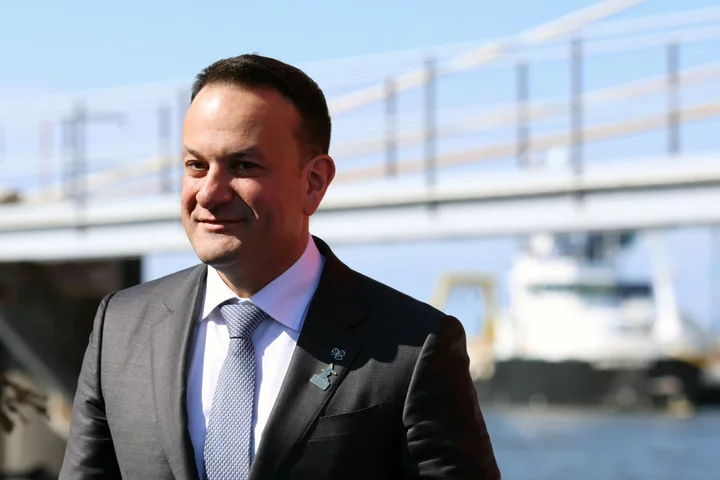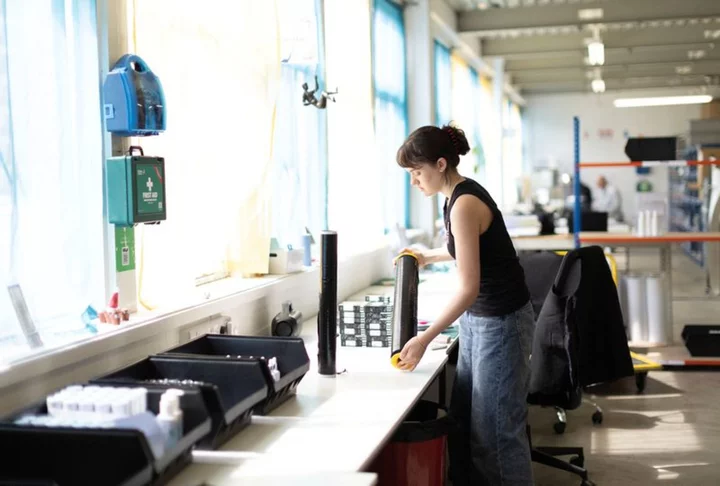Bond investors have been burned repeatedly in Argentina, which has defaulted on its debt nine times since winning independence in 1816. Now, just days ahead of a crucial presidential vote, another crisis is brewing.
Javier Milei, a brash, libertarian outsider, vows to completely upend the economy. His incumbent-party opponent Sergio Massa wants to keep spending in the face of triple-digit inflation.
Whoever takes office, investors are worried. Holders of some $65 billion of sovereign debt — including major investors like Pimco, BlackRock and Fidelity — have already seen the bonds hemorrhage roughly $24 billion in value since the last restructuring in 2020. And they know, if history is any guide, that more losses are likely.
“Argentina, from the macroeconomic and fundamental perspective, has been going the wrong way for quite some time,” said Mila Skulkina, a money manager at Lord Abbett & Co. “It’s quite difficult to see a turnaround.”
The country’s overseas bonds have been some of the biggest laggards in the world since they were issued three years ago as part of a restructuring.
The next major debt payments were pushed out until 2024 and 2025, and most of the notes trade below 30 cents on the dollar — with yields that suggest traders are preparing for a 10th default.
What comes next depends on who voters choose on Nov. 19. While investors like Milei’s promise to take a chainsaw to public spending, they worry his radical proposals to dollarize the economy and shutter the central bank could spark social unrest, making the necessary reforms difficult to pull off.
Massa, meanwhile, represents the ruling leftist coalition that oversaw the nation’s most-recent surge in inflation and economic turmoil. While some investors say Massa has the political clout to make needed reforms, he has so far relied on government spending — financed by money printing — to sway voters.
To Mike Arno, a money manager at Brandywine Global Investment Management, uncertainty over what the next president will do once in office is reason enough to avoid the debt. He sold the Argentine bonds in his portfolios after Milei unexpectedly came out atop in the August primary vote, and said the firm must “think about if and when and how we should be invested.”
It’s a question that’s coming up for others on Wall Street, too. Investors have been little compensated for holding the notes over the past three years.
Holding $1 million of Argentina’s 2030 bond since the latest restructuring, for instance, would have netted roughly $11,000 in interest payments, according to data compiled by Bloomberg. The value of that holding, though, has fallen to approximately $565,000, indicative price data show. That leaves holders of the debt to either wait and hope, or accept losses and sell.
Such losses have all but certainly made their ways into portfolios — even if the country makes up relatively small portions of the holdings of major funds. BlackRock’s Global Allocation Fund, Fidelity’s New Markets Income Fund and Pimco’s Income Fund, for example, have all seen their holdings of Argentine notes lose at least 33% since the country’s last restructuring in September 2020, according to data compiled by Bloomberg.
Representatives for the three firms declined to comment on the figures and on their positioning in the country ahead of Sunday’s election.
For some, of course, those losses translate into an opportunity — especially if the next president surprises the market and embraces policies that stabilize the economy, the peso and the bond market.
“The challenges for the next administration, whoever it is, are incredibly large,” said Stuart Sclater-Booth, a portfolio manager at Stone Harbor Investment Partners in New York. The firm is holding Argentine bonds at a level consistent with JPMorgan Chase & Co.’s emerging-market benchmark gauges, he said.
“I don’t want to be too unexposed,” he said, “because if I get it wrong, there’s a lot of yield and return potential that you are giving up.”
Payments Pile Up
For those who wait and see, the risk of another default is paramount. Argentina’s central bank has long been out of easy-to-spend foreign-currency reserves, raising questions about how the next government will afford to make coming bond payments.
Investors expect to get $2.6 billion in interest and principal next year, with the first major payments coming due in January — just weeks after the next president’s inauguration. That amount more than doubles to $5.6 billion in 2025, according to economy ministry data.
To Richard Hall, an associate portfolio manager with T. Rowe Price, there are still uncertainties about how the country will regain market access, address its economic turmoil and manage its debt load.
Credit-default swaps, though little-traded, already imply a 100% chance that the government fails to make payments and falls into default within the next five years.
“There’s no attractive path for any candidate. Either will try to launch a stabilization program as soon as possible,” Juan Manuel Pazos, chief economist at Buenos Aires-based brokerage TPCG said. “The big question is whether it will be something credible, or another coat of lipstick on the pig.”









